Cor! Peter Doherty comes alive in Amsterdam
The way it was, the way it is and the way it will remain
I always thought the reason I have loved Peter Doherty for the past 23 years was because he has written (or co-written) and delivered some of my favourite lyrics, one line of which (“If you’ve lost your faith in love and music, the end won’t be long” from “The Good Old Days”) is tattooed on one of my daughters (it’s a family-wide love affair).
But, on the first properly warm day of this year’s spring season, Doherty gave me another reason to keep the faith with a live performance at Amsterdam’s Melkweg that was enthralling and endearing, intimate and immersive.
The occasion was his tour in support of upcoming album, Felt Better Alive, and it was revelatory in ways that felt true to an artist acclaimed for his poetic writing, both wide-ranging and minisculely observed.
This was the fourth time I had seen Doherty on stage.
We’d been in the same venue in November 2022 for the 20th anniversary tour of The Libertines’ Up The Bracket when the best band to come out of London since The Clash played their still stunning debut album in full, plus a generous helping of songs off other records. We’d also seen Doherty perform with Frédéric Lo in support of their enchanting collaboration The Fantasy Life of Poetry & Crime at ‘t Zonnehuis. The venue in Tuindorp Oostzaan was built in 1932 in the Amsterdam School style, and originally served as a meeting place for the workers’ union of the NSDM Wharf and so felt just right for an artist with an appetite for the often hidden folds of history that surround him. In November 2019, with two of my daughters, I’d been in the crowd when The Libertines played two nights at Utrecht’s Tivoli venue. Thanks to a chance encounter with the band’s acclaimed photographer and filmmaker, Roger Sargent, we were at both of these shows (Sargent had spent some of his childhood in South Africa and, on hearing our accents while we were at the merchandise stand on the first night, we got talking). Those performances - among our first live shows after moving to the Netherlands - were teetering on the edge of unhappy chaos (at one point Doherty’s co-songwriter and creative consort, Carl Barât, seemed to shout “wake up” to his bandmate who was swaying, doubled over on his guitar). But they were also cut through with shards of brilliance and full of the thrill of finally seeing songs we’d listened to over and over in Johannesburg, for some seventeen years, being played live.
At Melkweg last week, Doherty offered up just the right amount of easy engagement with the capacity crowd - enough chat to feel warm and personal but not so much as to remove the touch of mystery that all the very best artists carry with them like a well concealed tattoo. Because he picks up a guitar just a handful of times in this live configuration there was lots of movement about the stage and micro gestures to animate the songs - which might sound cheesy when you read about them here but were quite lovely to observe. There were moments of earnestness and elevation as Doherty looked aloft, and also bits of whimsy as he turned and gently twirled, conjuring visions of Albion, the ancient, literary synonym for Britain that has been a consistent compass for Doherty since the very beginning of his music career.
On 16 May Doherty will release his first solo album in nine years through Strap Originals, the label he co-owns, and the title track comes half-a-dozen songs into the 20-song set. Like just about every Doherty song I have heard, “Felt Better Alive” contains lines that I instantly adore,
“Dredged the mouth of the Humber, felt better alive,
Slipped unnoticed across your border, felt better alive.”
“Dredging the mouth of the Humber” is a line from (his beloved Tony) Hancock [about coagulated sprinkled sugar in the bottom of a bowl of cornflakes],” Doherty said on the single’s release in January. “The chorus I love, “And I’d always planned/To sing in a sweet and soulful way as only cowboys can/But my saddle strap snapped like a dog-chewed tourniquet…” It’s an accurate description of how I feel about certain times in my life, y’know? Treasures of the Sierra Madre: you set off on this mission for the gold and you just ended up lost in the mountains, being hunted by bandits.”
“Felt Better Alive” is one of several off the upcoming album that show up in Amsterdam.
“We will not be deterred, we will not be broken, we will never give up getting this song right,” declares Doherty before launching into “Fingee”, a clattering, raucous song that strains at the leash. He debuts the beautiful new composition “Ocean” (in the same month, I notice a few days later, as David Attenborough’s new documentary, also called Ocean) that has the makings of an album standout, as well as the tender “Pot Of Gold” which, like so much of Doherty’s songwriting, comes with a reminder that the human condition means that the light always accompanies the dark, here wryly skewering the classic lullaby “Hush Little Baby” (“Daddy’s trying to write you a lullaby, and if that lullaby is a hit, daddy’s gonna buy you loads of cool shit, and we’ll forget about the times when they always tried to run me out of town…”). There’s also a great rendition of new single “The Day The Baron Died” with its cheery use of a typical English slang word,
First time l saw the Baron's claw
Heads poking ‘round the terrace door
Made of silver and gold and bits of iron ore
Well, we all said “Cor”
Few bands can conjure up a sense of place with the ease and flair of a candy floss spinner at a fair like The Libertines. From songs like “Up The Bracket” (“I saw two shadow men on the Vallance Road”) and “You’re My Waterloo” (“And you see I've brought you flowers/I've brought you flowers, all collected from the Old Vic Stage”) to last year’s album, All Quiet on the Eastern Esplanade, named for the location of the bands’ The Albion Rooms hotel and venue in Margate, we are frequently drawn into a physical as much an emotional space. Doherty’s fixation on all things bingo and Blighty and Boadicea and filtered through music hall and Auden and skiffle and punk is the romance of a traditionalist. It nonetheless makes sense that Doherty’s new material reflects his current context living in France with his family, tonight delivered in front of a screen showing Peter Falk in Columbo, the television series centred on a disheveled but masterful crime buster. Before playing “Calvados”, another new song, he tells us that “it’s basically a love song to Normandy” and asks us “to picture the scene if you can”. The song about a brandy made from apples or pears is pastoral, comforting, sweetly sung.
“The farmer sits holding the reigns
Guiding the cart through Normandy lanes
Slow and steady is the way
The way it was, the way it is, and the way it will remain …”
In this spirit of the past, present and future, alongside showcasing new songs last week’s show also coaxes a remembering of those tucked into records already made - whether as part of The Libertines, solo, with Babyshambles or with Peter Doherty and the Puta Madres, the band he formed with his now wife Katia de Vidas, who is also on stage with him at the Melkweg.
One of these is “I Am the Rain” off Doherty’s debut solo album, Grace/Wastelands, which was co-written with John Robinson of The Bandits. “It was a lovely day today, ladies and gentlemen, wasn’t it?” Doherty says to cheers of agreement which quickly die down when he adds, “it’s alright for some”, a reminder of how not everything is sunny for everyone at the same time, even if it appears that way. Another is “Someone Else To Be” - a reimagining of The Velvet Underground’s “Ride Into The Sun” that also quotes Oasis’s “Don’t Look Back In Anger” and has moved beyond tribute to take on a mood of its own some five years after appearing on Peter Doherty and the Puta Madres. Also on the setlist is “For Lovers”, a starkly heartfelt single that Doherty recorded with Wolfman in 2004, its simplicity belying a particularly tangled time in his then very public life.
The set ends with a thrilling showcase of Doherty’s gifts - “Last of the English Roses” (a beat-heavy slice of nostalgia which contains a lyric that always makes me smile - “You could charm the bees knees off the bees”), and “Time For Heroes” (among The Libertines’ finest, most emblematic, songs). Second to last is “Fuck Forever”, a song released on the Mick Jones-produced 2005 Babyshambles album Down in Albion, (the direct lineage from The Clash to The Libertines having been established by Jones producing the group’s incomparably great first two albums). It contains lines that feel as appropriate as they did 20 years ago:
“Oh what’s the use between death and glory
I can’t tell between death and glory
New Labour and Tory
Purgatory and no happy families”.
The closing song is a cover of The Smiths’ “Panic”. Doherty has never made a secret of his adoration of Morrissey or the influence of The Smiths on his music but this is not throwaway adulation. There’s the not unexpected location change (“There’s panic on the streets of Amsterdam”) and a variety of additional methods to deal with the DJ (“Hang the DJ, fuck the DJ, stab the DJ” etc). But this version is both homage and bloodline that connects these two most English of artists, messy, heartsore, scrappy, eloquent poets of an England of the mind, the cherished and broken dream of Arcadia pursued - with unvarnished self deprecation - in all its tarnished glory, where only the wittiest can survive. That bloodline is made flesh by the presence of Mike Joyce (of The Smiths), introduced without fanfare, on the drums, and the song was tackled with urgency, like it meant something, and it felt like a peak. There was no encore proper - that hoary ritual is a lifeless vestige of the concert hall that is best buried and forgotten. This way was more than good. It was better because it felt alive.
I leave you with this small detail, dear reader.
There are several websites dedicated to The Libertines facts and arcana and it’s on one that I read that the band recorded a copy of “The Good Old Days” during the Babyshambles Sessions in May 2003.
“In that recording Doherty whispered "get a tattoo", as an answer to Barât's line "a list of things we said we'd do tomorrow". Apparently this was the reason that both Doherty and Barat had "libertine" tattooed on their arms (which is seen on the cover art for their second album, The Libertines).”
Without knowing this, it is, as I’ve written, a line from this song that my daughter had tattooed on her body more than a decade ago, something I inevitably find wonderfully mystical. You can listen to this version of the song here.
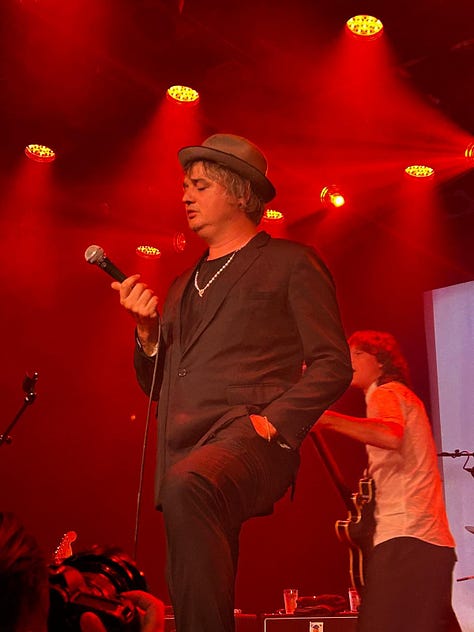
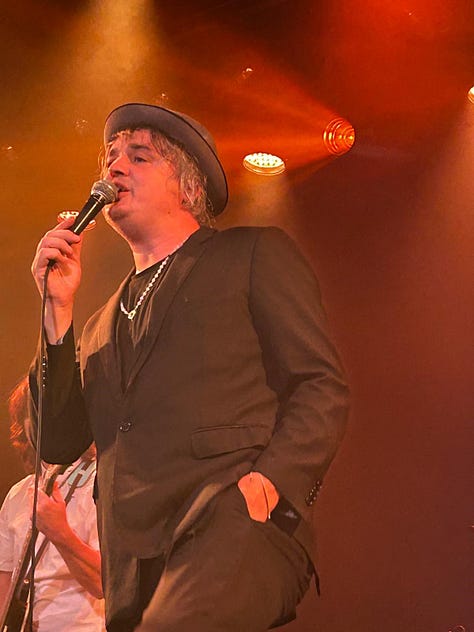
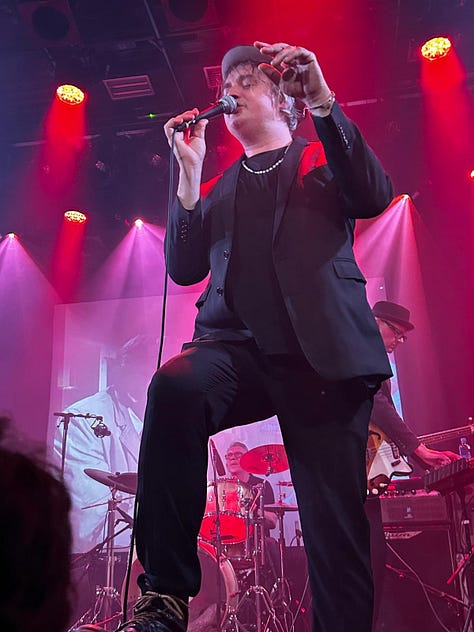




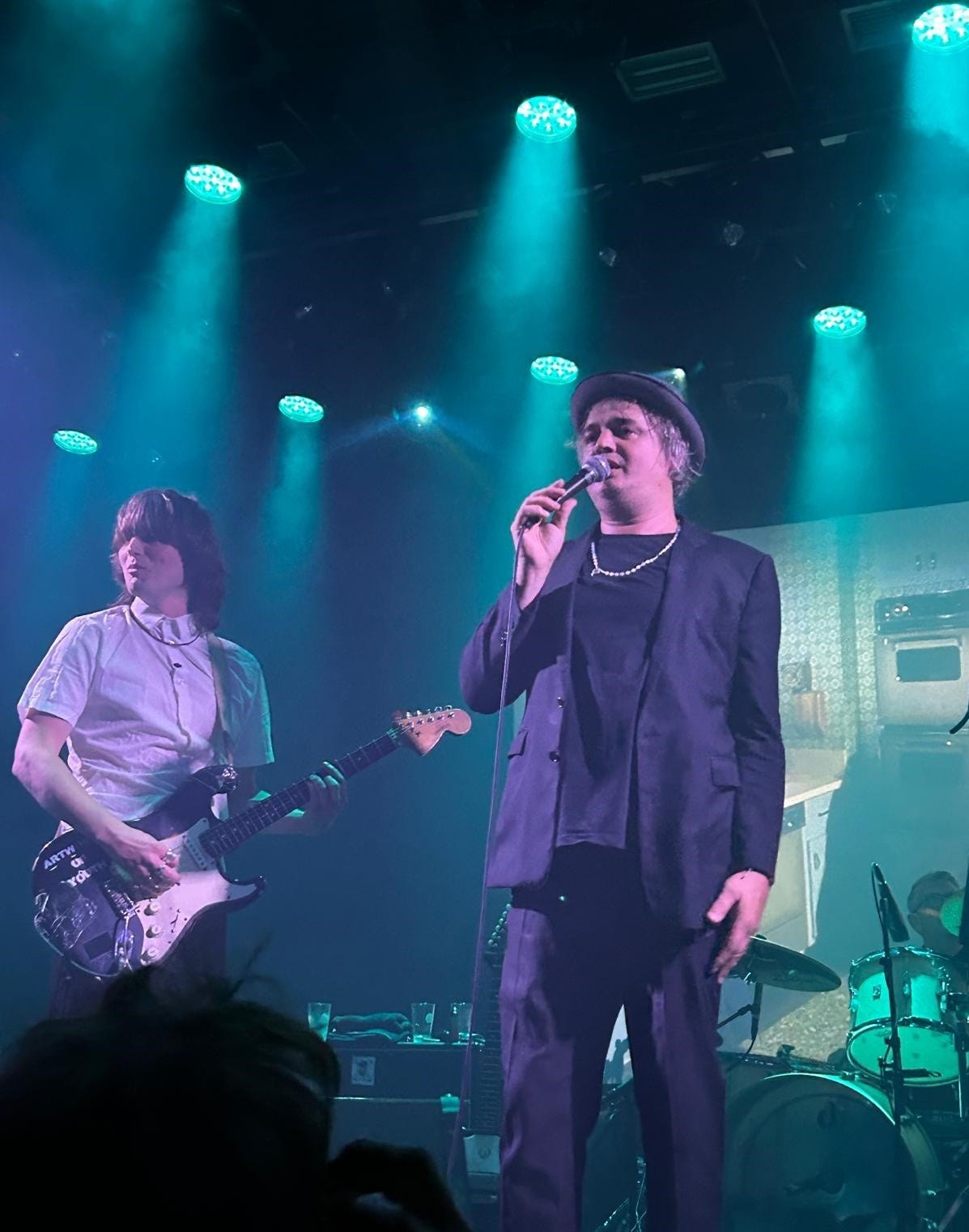
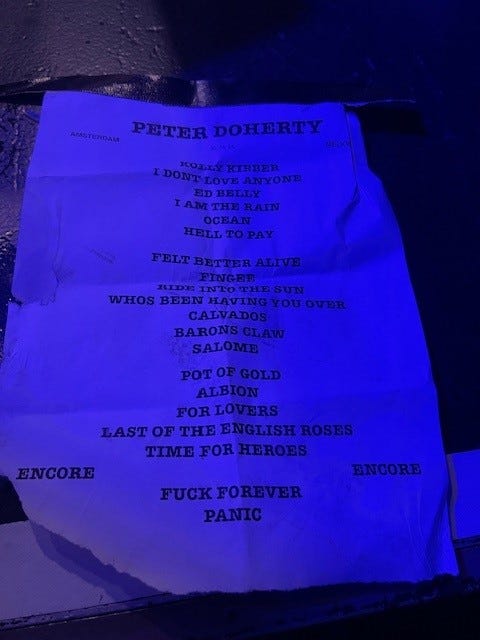
I love the line '......also coaxes a remembering of those tucked into records already made'. So beautifully written. I wish i could coax words like that out of my head! Now to go and listen to some of these songs again, not knowing them all that well. Thanks Di.